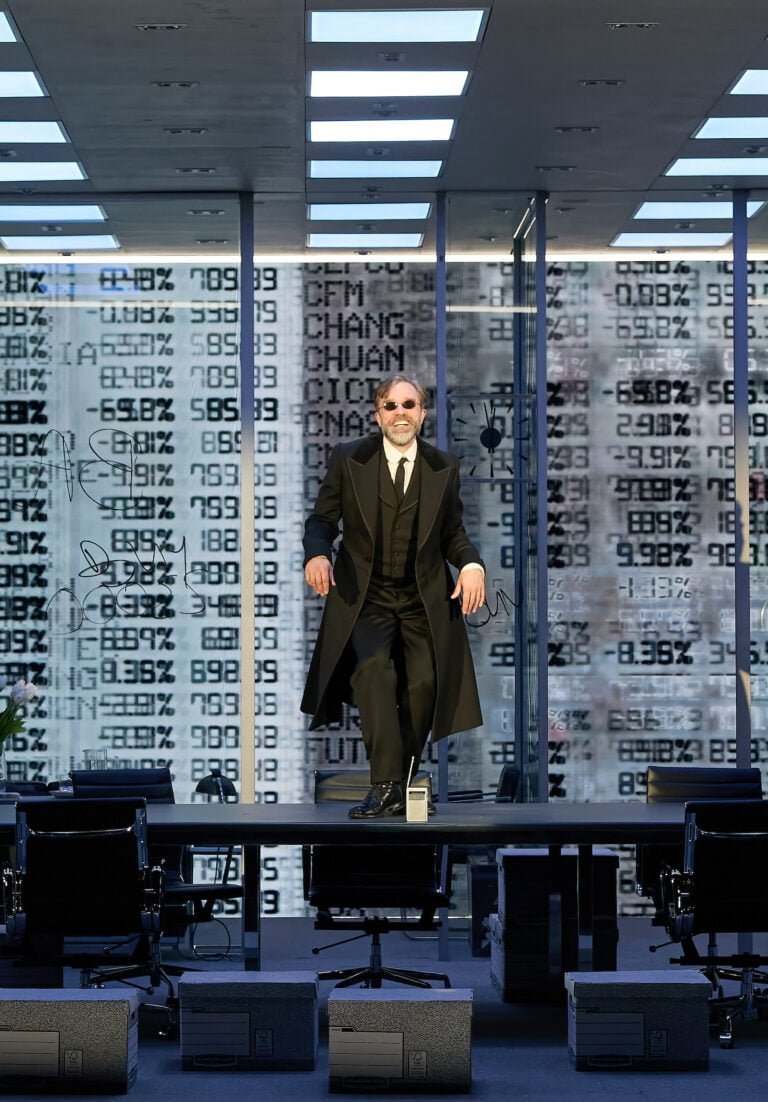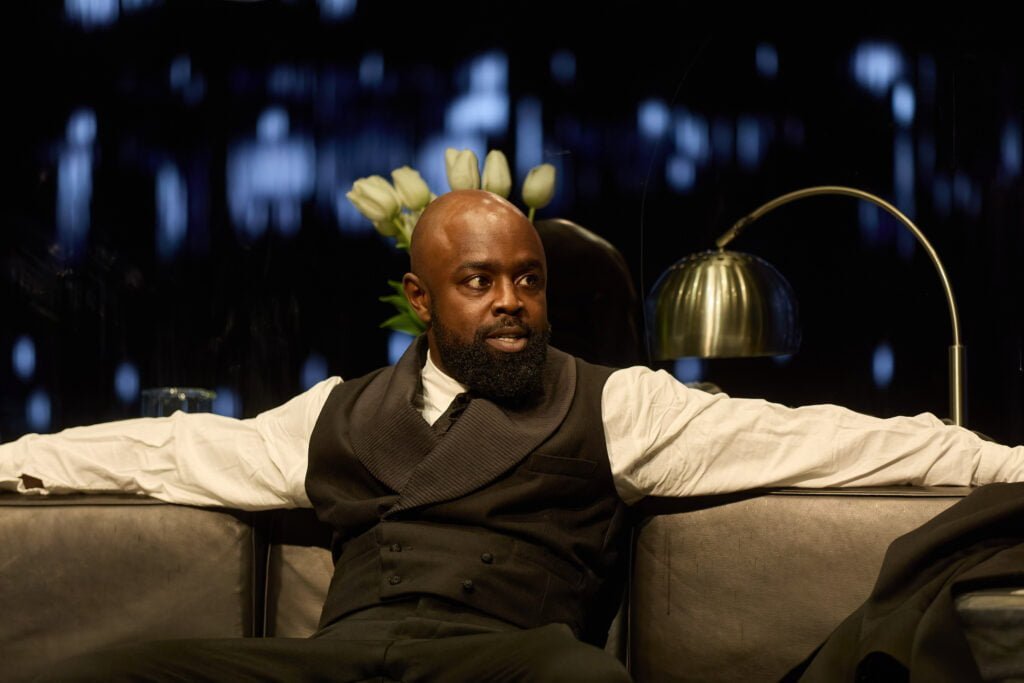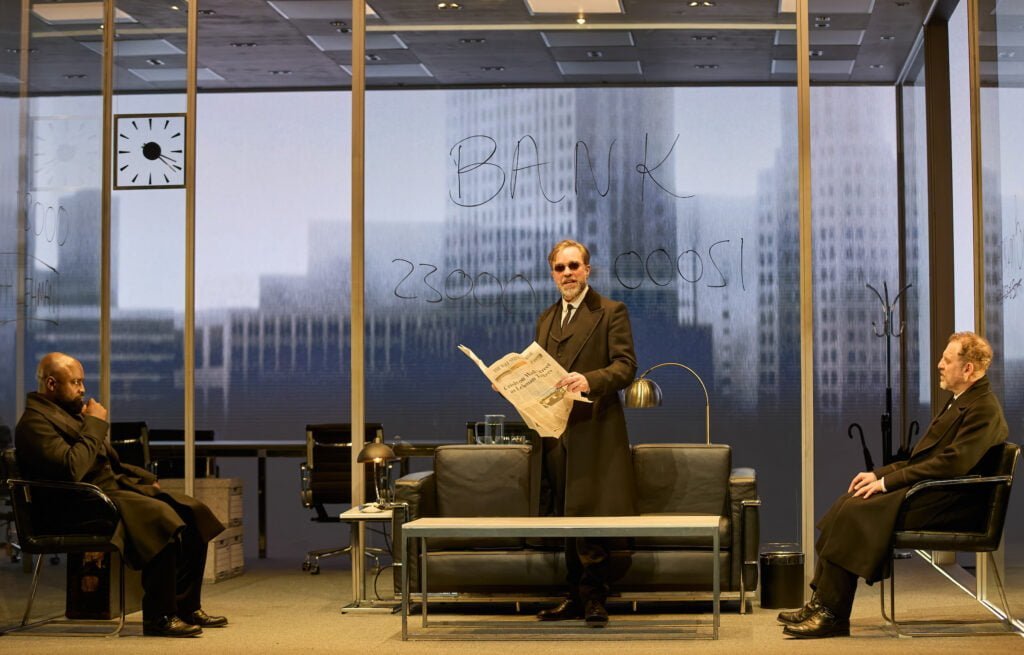They were invincible! Until they weren't...
“Buying is Living – It’s not for need.”

If you’re not familiar with the background, this is a chronicle play depicting the arc of the Lehman Brothers’ Bank, from Alabama dry goods store to mighty Master of the Universe Wall Street investment finance house. The Family’s success mirrored the rise of the United States to super power status but Lehman’s own story ended in spectacular bankruptcy in the financial crisis of 2008: a classic tragedy of hubris and nemesis. Iconic photographs show the staff leaving the building on September 15 carrying their belongings in cardboard stationery boxes. Very similar boxes are used to great effect in Sam Mendes’ acclaimed National Theatre production of Ben Power’s adaptation of Stefano Massini’s Tony Award winning play, now re-opened at the Gillian Lynne Theatre in Drury Lane.
Link to our review of the original National Theatre production.

The Trilogy is a triumph of performance, stage craft and design. Michael Balogun, Hadley Frazer and Nigel Lindsay play the various Lehmans at different stages of the business in addition to well over 10 other characters (I lost count) including wives, babies, small children, teenagers and an elderly rabbi. The mimicry is perfect, including an exchange that sounds like rapid fire banter from a 1930s screwball comedy. The timing is faultless and the verbal and physical memory load must be tremendous.
This all takes place within Es Devlin’s huge rotating glass cube set against Luke Hall’s video wall. Yshani Perinpanayagam’s live piano counterpoints the action throughout. And at nearly 3 ½ hours there is a lot to make the audience work as well.

But yet, like Herbert Lehman who questions the Deity’s Plagues of Egypt programme, I have some problems with the play itself. I suspect writer Stefano Massini consciously wanted to distance himself from the hard-edged dramas of Oliver Stone and Martin Scorsese in favour of something with a lighter touch, a Commedia dell Wall Street. Stock characters – nerds, thugs, and eccentrics – roll the action along. Easy generalisations abound: The Hellish racket of the factory… Only in New York will we make the big money… Everyone else in New York goes wild! Albeit along with a couple of prophetic nightmares.
This makes for a certain hollowness in the content, tone and pace of the play. So in the 25 years of Part One the Brothers come to America and start the business. As family, they bicker and disagree and laugh at young Mayer for his potato-esque character – a gag that is repeated far more often than it deserves – and their move into brokerage is treated sympathetically and in some detail, though without mentioning the obvious point about Alabama. Part Two covers 60+ years to show the Bank’s rise in New York up to the Wall Street Crash. Part 3 – where things go so badly wrong – really gallops through the last eight decades to the final catastrophe in 2008, though with little attempt to explain how it happened.

But perhaps this acceleration, and confusion on the part of the audience, is meant to convey that of the protagonists themselves. Or are we assumed to be so familiar with the story that no explanation is needed? The changes in the financial universe the Lehmans finally inhabit, with its global computer networks and algorithms, is hard to deal with dramatically but surely it is the climax to which this lengthy evening leads? Entertainment is fine, but don’t we need to understand the tragedy? Or the darker side of the Brothers’ success.
Who in antebellum Alabama actually produced the cotton they brokered? After the Civil War the Brothers realise that “Everything here was built on crime.” And, “The Slaves are Free!” Which is an over-simplification, to say the least. These jarring notes don’t sit well with the light tone and clever mimicry one finds elsewhere, such as the ritualised wooing of the Lehman Brides and the personal eccentricities of Bobby Lehman. The intention may be to humanise these extraordinary characters but it risks distracting from the business at hand.
And isn’t Business at the heart of this story? But what have we learnt? That the Lehman family found their mojo in Alabama but lost it somewhere in Manhattan. Would the story have more impact if it had been run backwards? Perhaps, but as realised here, The Lehman Trilogy makes a compelling evening’s viewing.

Production Notes
The Lehman Trilogy
Written by Stefano Massini
Adapted by Ben Power
Directed by Sam Mendes
Cast
Starring:
Hadley Fraser
Michael Balogun
Nigel Lindsay
Ravi Aujla
Will Harrison-Wallace
Creatives
Director: Sam Mendes
Set Designer: Es Devlin
Costume Designer: Katrina Lindsay
Lighting Designer: Jon Clarke
Music and Sound Designer: Nick Powell
Movement Director: Polly Bennett
Video Designer: Luke Halls
Music Director: Candida Caldicot
Pianist: Yshani Perinpanayagam
Information
Running Time: Three hours 30 minutes with two intervals
Booking to 20th May 2023
Theatre:
Gillian Lynne Theatre
166 Drury Lane
Holborn
London WC2B 5PW
Box Office: https://lwtheatres.co.uk/
Tube: Holborn or Covent Garden
Reviewed by Brian Clover
at the Gillian Lynne Theatre on 8th February 2023

